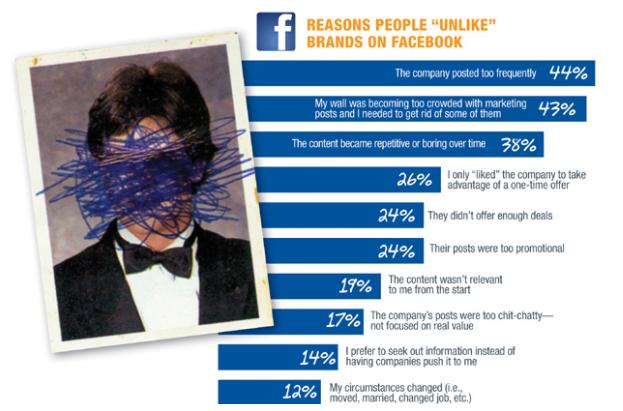I have a message for marketers, social media managers, advertising whiz-kids and anyone else who thinks social media needs to be flashy: Quiet in the cheap seats. There’s a rant coming, and it’s got your name on it.
I see a trend hitting New Zealand Facebook pages (although it’s not limited to that medium alone): Big, fancypants apps and huge ad spends that your target audience doesn’t actually care about. Multiple posts pushing to said app or competition or marketing ploy. LIKE or SHARE this post to spam all your friends in the hope that maybe, just maybe you’ll win something.
You know what research shows your audience does care about? Special offers and rewards. Insider intel. Having fun with your brand. Staying on-topic. Not being spammed. So why are you trying to convert people with songs-and-dances that are so off-brand that you know you’re not getting genuine fans?

But the long term goals are being ignored, and probably because someone’s KPIs are measured by how many ‘likes’ a page gets during the campaign.
WON’T SOMEBODY THINK OF THE CHILDREN*???
*by children, I mean customers. You know, those people who actually fork over their money to use the brands services?
Please, for the love of all that is holy, stop the gimmicks. People will unlike/hide your page as soon as they see they aren’t getting any real value, or because they only liked to win something, and then it’s so much harder to get them back again.
If you want a strong, long-term social strategy, don’t wage it all in a hook. But if you only want good-looking but virtually meaningless stats to sit on a spreadsheet that no one truly understands, go for gold.


“People will unlike your page as soon as they see they aren’t getting any real value, or because they only liked to win something.”
Do you think that *most people* actually do kill off useless follows? Or do they just not care enough to ‘clean up’ their likes?
On Facebook, they hide. And not just hide the post, they hide the entire brand. Twitter, I don’t have the data for; They just don’t have the same insights and reporting tools that FB do to test the theory!
Real Groovy has it right. They are funny, have cool merchandise and never ask anyone to share or retweet anything. The other day they had zombie slippers and they also had a tent that looked like a VW combi van a while ago. They post pictures of their staff doing funny things and tell you when a band or dj is going to play at the store. They mock everyone, which is also quite good. And my sister works there. Mookie. Pop in and ask her for Susan Boyle unplugged. She loves that shit.
I used to follow more brands than I have Facebook friends. Then I hid everything I didn’t care about. Hello actual friends! Twitter is a bit different because I’m there in a professional capacity as much as I am in a personal The pages that survived the cull are smallish genuine communities. They’re not brands, they’re genuine interest groups. I don’t ‘like’ anything to win anything unless I genuinely want a crack at the prize. I don’t do it for a block of chocolate. I can understand why people are tempted by the content ad products on offer especially when you’re managing a presence for a brand that doesn’t have much capacity for fun or isn’t a genuinely social, chat about it round the water cooler kind of brand. Fan numbers is an easy metric whereas actual engagement takes time. We’re still trying to jam social into the campaigns, old school marketing paradigm where numbers matter.
I guess, lets face it, being a bank on social is a hard ask. As is any other nitty-gritty industry. I guess the question is: What does your audience want from you on social? Be and do that, rather than flash in the pan grabs.
I would like to think building real, helpful communities will win out at the end of the day, but there’s also truth to the saying “the squeaky brand gets the good PR”. I just made that up. You can borrow it, if you like.
Insightful and intriguing questions, definitely useful for page/brand managers to be aware of. Also referring to your ‘5 major mistakes brands make on FB’ post. But anyone can be a critic. Do you have any actual advice that isn’t based on hindsight? Not meaning to troll here, you seem very knowledgeable on the subject. However from my managerial experience I prefer that people present a solution rather than a problem. Abstract ideas and goals are nice, only if you can put your money where your mouth is.
It’s hard to be any less than abstract when discussing commercially sensitive information, and blogging generally about something that’s bespoke to particular audiences. I have, however, written about Facebook pages 101, Facebook’s tips for SM strategy, my tips on brand posts, and Facebook’s best practice for marketing. Hope that helps.
Awesome, thanks Cate!